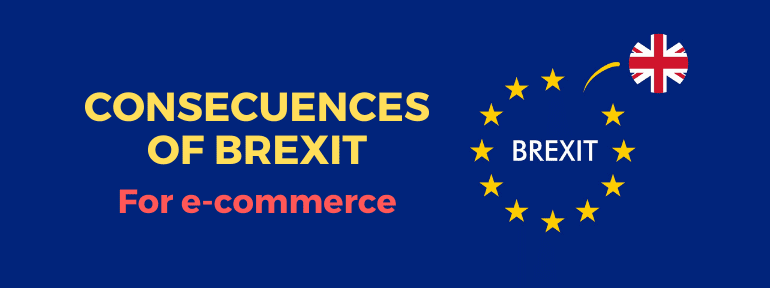This 2019 marks three years since the referendum that approved the exit of the United Kingdom from the European Union, a process known as Brexit. Its effects didn’t take long to arrive once this exit was approved: the pound sterling began to lose value against the euro, companies and investors fled to other countries, among other consequences.
The consequences of Brexit for e-commerce are also on the negotiating table, while the owners of online stores and businesses try not to lose sight of the progress of this process, adapting their projects to the changes and transformations that may occur.
In this article we’ll explain what could be the consequences of Brexit on Ecommerce and how to face them regarding our businesses and online shops.
Table of contents
Consequences of Brexit for e-Commerce

There are five possible scenarios with the exit of the United Kingdom from the European Union. Only the ”orderly exit” would mean stability in e-commerce between Spain and the territories involved in the Brexit.
However, if the final scenario of this whole process is the ”No deal” (the exit of the United Kingdom from the single market without any agreement) shipments of products or commercial transactions to and from these territories should be carried out in the same way in which they are carried out with the rest of the countries.
If the exit of the United Kingdom from the European Union finally becomes effective, it’s necessary to take into account a series of elements in your e-Commerce. Especially if the UK market plays an important role in your online store, you should pay attention to the consequences of Brexit for e-Commerce that we present below.
Impact on logistics fees
Fees related to distribution and shipping costs could increase significantly. Sending products from Spain to customers outside the European Union will be much more expensive than before since they’re not in the single market.
Customs duties and import tax
Linked to the previous element, it should be noted that purchases by UK customers from Spanish online shops or Spanish customers from UK digital retailers will have to pay customs duties and value added tax if they’re cross-border transactions.
Deliveries won’t be as efficient as before and there are likely to be delays due to customs holds on these shipments
Currency fluctuations and changes
Due to the constant changes resulting from the consequences of Brexit and the negotiations involved in this process, currencies will be fluctuating quite a lot. Therefore, if you work with multi-currencies, it’s recommended to identify a fixed exchange rate, checking it every month or week so that it doesn’t affect your transactions significantly.
Effects on the final price of the product
All the consequences of Brexit for e-Commerce mentioned above can affect the final price of the product, taking into account all customs costs and so on. It’s important to pay attention in this regard and inform yourself about all the requirements for shipping and transactions with the UK, in order to reflect all this in the offers of your online store effectively.
Legal implications
With Brexit, the UK will have to set its own regulations for e-commerce. This can have legal consequences between territories, making it more difficult to transact business. All this implies assuming the costs of operation and bureaucratic red tape.
Loopholes in personal data protection policy
Brexit has the consequence that the UK no longer has to abide by EU data protection law, which may lead to it being identified as an unsafe territory in this regard.
How can we prepare ourselves to face the consequences of Brexit in e-Commerce?

As some European companies and businesses are already doing, it’s recommended to be informed about all the measures and possible scenarios that may occur in this process. All this, with the aim of continuing to offer customers the best service while minimizing the effects that these transactions may have.
In case the exit of the United Kingdom becomes effective under the scenarios that don’t foresee an agreement with the European Union, e-commerce will need to take a series of measures to face the change successfully.
The first, as mentioned above, is to keep informed at all times of all the transformations that may occur. In this way, we’ll be ahead of any change, taking the necessary precautions to continue providing services to our customers without any affectation.
What measures should companies or eCommerce take in the face of Brexit?

To export or import from or to the United Kingdom, companies should indicate any changes in customs processes and the new tariffs that will be applied in transactions between the European Union and the United Kingdom.
Experts recommend purchasing customs software or hiring a customs broker to streamline and effectively manage customs procedures. A customs software offers companies and customs agents a program where they can manage these operations taking into account all the necessary documentation and requirements.
The shipped goods must be properly coded and classified and check if some items require an export license. In this way, the corresponding amount of taxes will be paid, a process that you can speed up if you contact the customs authorities as soon as possible.
What are the mandatory details for exporting products?
- Description of the product and its classification code.
- Value of the goods.
- In which country the goods were manufactured.
- Sender’s address and EORI number in the UK and/or EU.
- Receiver’s address and telephone number.
The EORI number (Economic Operator Registration and Identification number) can be requested through the website of the local customs authorities. It’s a mandatory and necessary code for importing and exporting outside the European Union. It can take up to three days to obtain.
It’s also necessary to identify the TARIC code (commodity code), a number that identifies a series of elements such as: the type of product, VAT, among others.
On the other hand, to send products outside the European Union a commercial invoice is needed when the products are associated with a commercial transaction or for resale. On the other hand, a pro forma invoice is required when shipping products that have no commercial value.
Conclusion
As explained, the Brexit is a complex process that has dragged on due to the numerous negotiations within the UK and with the European Union. For any of the possible scenarios, every e-commerce must be prepared and willing to face the corresponding measures.
None of the parties involved would like to see being affected the digital trade relations between these territories, which have been fully consolidated and stable for some time, although uncertainty currently reigns.
Therefore, from each of our strategic positions, we can do our bit by taking the necessary precautions to deal with the consequences of Brexit on e-Commerce.




Deja un comentario